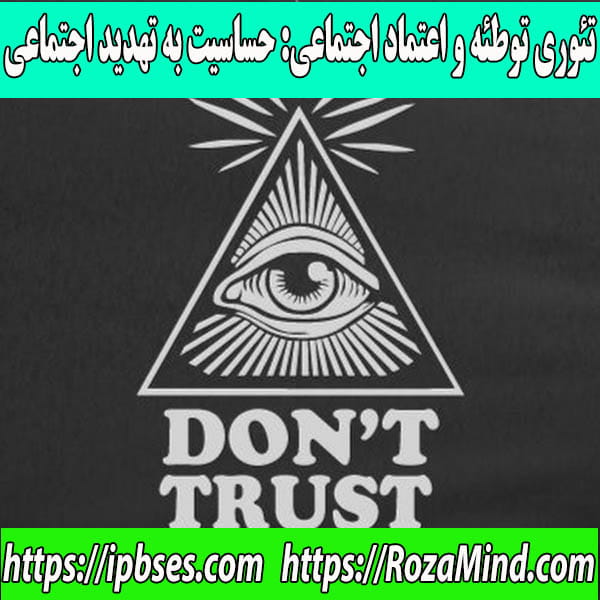پژوهشگران دانشگاه ماینتس آلمان در پژوهشی آزمایشی به بررسی میزان حساسیت به تهدید اجتماعی در زمینه باور به تئوری توطئه و اعتماد اجتماعی پرداختند.
روش پژوهش تئوری توطئه و اعتماد اجتماعی:
در این پژوهش آزمایشی آنلاین تعداد 1105 نفر داوطلب شرکت نمودند. ابزارهای پژوهش شامل پرسشنامه اطلاعات دموگرافیک، بازی کامپیوتری اعتماد، القای کامیپوتری تهدید اجتماعی، پرسشنامه اعتماد عمومی، پرسشنامه اعتماد به مراجع قدرت، و پرسشنامه باور به نظریه توطئه بودند.
یافته های پژوهش تئوری توطئه و اعتماد اجتماعی:
- میزان باور به تئوری توطئه رابطه عکس با میزان اعتماد به دیگران دارد.
- میزان باور به نظریه توطئه رابطه مستقیم با میزان رفتارهای محتاط فرد در روابط اجتماعی خود دارد.
- میزان باور به نظریه توطئه ارتباط چندانی به میزان رفتارهای تهدید آمیز افراد مورد اعتماد در روابط اجتماعی فرد ندارد.
- توان شناسایی درست تهدید اجتماعی، ارتباطی با میزان باور فرد به نظریه توطئه ندارد.
راهبردهای کارکردی پژوهش تئوری توطئه و اعتماد اجتماعی:
- به طور کلی افرادی که به تئوری توطئه باور دارند نسبت به همه شکاک و ظنین هستند. میزان شک آنها با هر میزان از رفتار درست و اعتماد آمیز طرف مقابل کم نمی شود.
- باور به نظریه توطئه منجر به شناسایی تهدیدات واقعی در زندگی و محیط اجتماعی نمی شود.
- هر چه میزان باور به تئوری توطئه بیشتر باشد، میزان حضور اختلالات روانی و شخصیتی در افراد بیشتر است. بنابراین در صورتی که فردی ادعاهای زیادی در مورد تئوری توطئه دارد، لازم است حتماً برای معاینه روانی به متخصصان بهداشت روان ارجاع شود.
Believing in hidden plots is associated with decreased behavioral trust: Conspiracy belief as greater sensitivity to social threat or insensitivity towards its absence?
Abstract
Past research has demonstrated that conspiracy belief is linked to a low level of self-reported general trust.
In four experimental online studies (total N = 1105) we examined whether this relationship translated into actual behavior.
Specifically, since the decision to trust relies on the ability to detect potential social threat, we tested whether conspiracy believers are better at detecting actual threat, worse at detecting the absence of threat, or simply trust less, irrespective of any social cue.
Method:
To this end, participants played multiple, independent rounds of the trust game, a behavioral measure for interpersonal trust.
We manipulated social threat by presenting photographs of their alleged trustees with varying intensity of facial anger.
In three of the four studies, trustors’ conspiracy beliefs predicted a more cautious investment behavior in the trust game.
This association, however, was not contingent on the social threat posed by the trustee.
Conclusion:
The present research thus joins a number of studies demonstrating that conspiracy beliefs can – under certain circumstances – influence everyday behavior.
Keywords
Conspiracy theories, Conspiracy belief, Trust, Social threat, Trust game.




